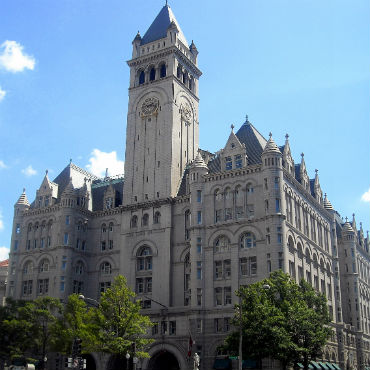2 1/2 cheers for GSA, Donald Trump and the Old Post Office
Steve Kelman reflects on what the development deal says about procurement and politics.

Donald Trump plans to convert the historic Old Post Office building on Pennsylvania Avenue into a luxury hotel.
A long story in The New York Times business section just recently got around to informing non-Washingtonians such as me that the Old Post Office on Pennsylvania Avenue is passing into the control of Donald Trump. The real estate mogul is planning to build a luxury hotel on the property, which he says will be ready in time for the Inaugural Parade in 2017.
My immediate reaction as an outsider who adores the Old Post Office was joy about what was going to happen to it. Its recent mixed use, with restaurants and federal offices, hasn't worked -- largely because government building security checks make it unattractive for the general public to go inside.
But as I thought about the story, I also started contemplating the things it says about American government and society that have nothing specifically to do with the Old Post Office. And most of them reflect well on our country.
The first thing I thought about was that the government had given the contract to develop the property to Trump. (Eighty firms had originally showed interest, and 10 had submitted bids to the General Services Administration.)
Wait a minute! This is the same Donald Trump who tried to run against Barack Obama for president and who was the highest-profile figure associated with the "birther" suggestion that Obama was not born in the United States. Yet the fact Trump had won a high-visibility government contract to develop an iconic building in the middle of Washington passed without notice.
In many, many countries around the world it would be unthinkable for a prominent opponent of the government to win a contract such as this -- or any government contract, for that matter. And this feature of our government is not only great from a perspective of public ethics, but also great in terms of long-term economic growth and prosperity for our country. The bestselling book, “Why Nations Fail,” by MIT economist Daren Acemoglu and Harvard political scientist James Robinson, argues that the ability to do well without having political connections is a crucial determinant of incentives for individuals to succeed through innovation and entrepreneurship rather than though obtaining government favors.
The second notable feature of this deal was that GSA innovated to find a new future for the Old Post Office. Dan Tangerlini, GSA's dynamic chief, is quoted in the Times as saying, "It's a beautiful, historic, iconic building, right on America's Main Street. But the truth is, it's not useful as an office building in the 21st century. It was best to find a private-sector partner to redevelop and put it to better economic use."
GSA, of course, has traditionally been in the business of managing government-owned building stock for government use. It's not easy, cognitively or culturally, to think a bit outside the box to develop a completely different approach to using this asset.
A third thing that caught my eye was Trump's confident statement the building would be ready for guests in time for the 2017 inauguration. Here my observation was less flattering to government. Almost 20 years ago, New York City handed over renovation of an iconic skating rink in Central Park to Trump after various delays in the city's own procurement process. It was noted at the time that Trump had a powerful weapon to keep the contractors he hired on schedule -- the threat to cut them off from other business his empire did with them.
Today the federal procurement process works better than in the past, and it is conceivable a government-managed procurement could also meet this 2017 deadline. But I wouldn't bet the farm on it. Government needs to learn that it too is a big customer, and it too should use its clout more aggressively than it does to get contractors to perform well.





